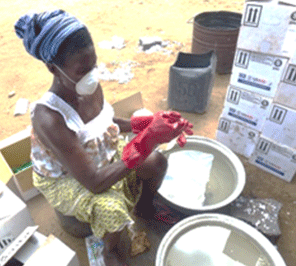
A woman works on converting insecticide bottles to paving stones. Photo: PMI AIRS Benin
PMI AIRS Project Collaborates with NMCP to Recycle IRS Bottles into Paving Stones
Indoor residual spraying (IRS) is a recommended strategy by the World Health Organization for vector control to reduce the burden of malaria. IRS requires the use of insecticides, which are most often packaged in plastic bottles. Rather than burning or disposing of the bottles, which can pose an environmental risk, the President’s Malaria Initiative Africa Indoor Residual Spraying (PMI AIRS) Project, in collaboration with the National Malaria Control Program (NMCP) of Benin, has collaborated with a local partner, Waste Recovery and Recycling Center (CREVAD), to recycle insecticide bottles. In 2016, the PMI AIRS Project in Benin sprayed 269,179 structures, providing protection against malaria for approximately 858,113 Beninese in the nine municipalities of Atacora Region. The spray campaign used 46,632 bottles of insecticides.
To recycle the bottles, staff at the project’s central warehouse wash and decontaminate empty bottles, taking care to avoid groundwater pollution or any other human contamination. Staff remove labels, caps, and plastic spots, wash the bottles inside and out with soap and water, cut the bottles and caps into small pieces, and grind the pieces down. The materials are dumped into a mixer, liquefied at high temperatures, mixed with sand, and molded and compacted into paving stones.
CREVAD transformed the 46,632 empty insecticide bottles from the 2016 IRS campaign into 1,120 paving stones. Not only did the 2016 IRS campaign in Benin protect over 850,000 people from malaria, it succeeded in handling pesticide residues in an environmentally-friendly manner, recycled the materials, contributed to job creation, and produced a useful product to sell commercially.
This story was taken from www.africairs.net.
